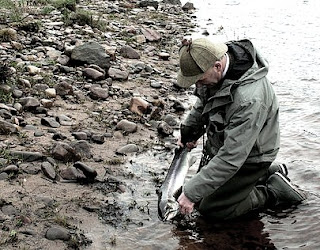I was talking to my friend Jon yesterday and he was telling me about how his father used to take him fishing when he was a young lad. He talked in particular about the moment when you land a fish and have to grab hold of it, remove the hook, and return it to the water.
In his introduction to coarse fishing, Paul Duffield offers a methodical account of this process. 'Be careful when unhooking fish,' he says, 'not to grip them too tightly, and only handle them with damp hands to prevent removal of slime.' It is relatively easy, if seems, to free a fish when the hook is in the lip, although to release a barbed hook you may need to shake it a little as you pull it out, and you might also need to use forceps 'if the fish is hooked deeper in the mouth and you cannot reach it with your fingers'. If the fish swallows the hook, you have to use a disgorger and Duffield emphasises the need to be able to lay hands on one quickly. You slide it onto the line, push it down until it reaches the hook and then a bit further so the hook comes free. Then you 'turn the disgorger by about 25 degrees and pull it back out of the fish'. This isn't difficult, he says, but you do need some practice.
You also have to follow certain procedures in releasing the fish, not throwing it back but placing it into the water 'nose first' and letting it swim away. Some fish actually need to rest in the water for a moment, held in your hands until they are ready to head off into the river or pond.
Jon talked about the experience of seeing all this happen for the first time (or first few times). You have a responsibility at that moment and the suddenness of it, the need to act quickly, to treat the fish humanely, to get it all right has the potential to make a big impression on a child. As Jon put it, it all feels very real.
Some moments do seem particularly real. Sitting in the corridor at the Hallamshire Hospital back in November, waiting to find out the status of the mole on the side of my nose, I experienced such a moment and that sense of reality receded again when I found that it was benign. Oddly, the realness of that moment arose from the sense of what might happen - something not yet real - and so the vividness of certain moments has quite a complex structure. I wonder if there is something of that with the child's reaction to the fish - the future crowding into the present as the creature fights for breath in front of you. For the moment, let's just imagine the young boy confronted with a fish on a line, reaching out with wet hands to take hold of it and set it free again.

There is something about the relationship of the 'real' to time that is interesting here. My father once gave me a book called 'The Power of Now' which I found rather absurd at the time but now I look back on that and think about now, its insistence in our lives. Fishing seems to reel back the 'now' as waiting is suspended time and then you get a nibble on a line. Reading fishing journalism ('The Waterlog Years') seems to be all about time. 'Time for a fat sandwich and a flask of tea'. 'We didnt have much longer to fish'
ReplyDeleteThen sometimes, there are moments ' out of time' when things go on for ever 'Everything was very still, very quiet and just on the edge of tedium'. The tedium of fishing is also something that interests me. Barbara Adams talks about different kinds of time, as does Jay Lemke. What would fishing time look like?
Thanks for sharing Jon's experience. I remember when my brother went fishing with a 'wise old man' family friend when I was young (I wasn't old enough to go fishing) and they gutted the fish in the kitchen sink. It was the first time that I had seen that the fish had red blood. Catching the fish, even though it wont be killed, is an encounter with death and I suppose this is very 'real' for anyone. It's well-being is dependent one you, even though you are responsible for any violence that has been done to the fish whilst you are catching it.
ReplyDelete